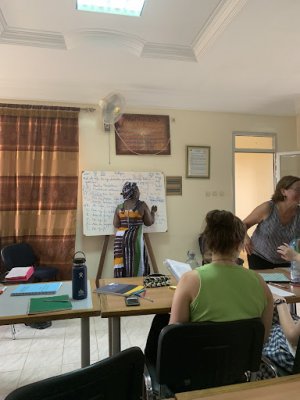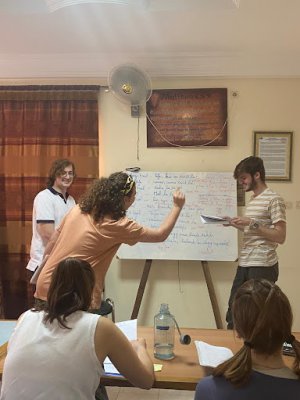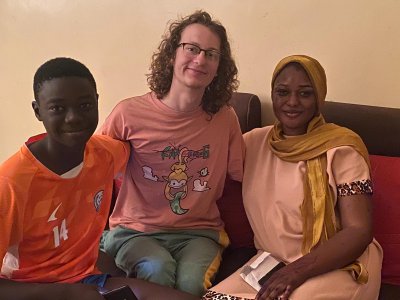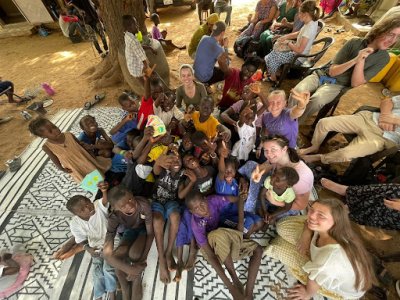Navigating the Language Barrier
In this post, Emma Zehr and Caleb Gingerich reflect on their experience with language in Senegal.
French and Colonialism
My host family does not speak any English. I took a semester of elementary French prior to arriving in Senegal, a country whose official language remains that of its colonizers. Despite that semester, my ability to communicate with my family and other people here has proven difficult. This language barrier makes it a challenge to form deep bonds with my family. I am often frustrated by my inability to verbally express my gratitude, ask questions that pique my curiosity, or engage in meaningful conversations about the contrasting cultural contexts I and my family members exist in. When my host mother, Annette, speaks to me, I catch only glimpses of the words flowing off of her tongue. I furrow my brows, and I see in her face a recognition that I do not understand her. In this space, I am a silly American who can only speak and understand English.
Sixty percent of the global population speaks at least two languages. Many of these bilinguals speak the native language of their region, as well as a Western European language, due to the West’s legacy as the violent imposer and colonizer. All the members of my Senegalese family speak French as a second language. Along with the rest of the Senegalese population, they must know it in order to participate in society, financially and politically.
Wolof
Their other national language is Wolof. Wolof is a first language for some 4.6 million Senegalese but is spoken by just about everybody. The language floods Senegalese media. Music, TV dramas, and news shows all feature the native Wolof rather than French, despite the political importance of the French language. Originally the language of the Wolof people, it is now a language known by virtually all people in Senegal, regardless of ethnicity.
Language and Communication
When we arrived in Senegal, one of the first aspects of the culture here that we learned about was the importance of greetings. These happen primarily in Wolof. We take Wolof lessons every Monday through Wednesday. Our first class period in Wolof was devoted entirely to Wolof greetings. The greeting starts with Asaala Malekum and is met with Malekum Saalam. This reflects the Islamic influence in Senegal and is borrowed from the Arabic meaning roughly, “Peace be with you.” It is followed closely by the Wolof, “Na nga def?,” which means, “How are you?” The reply is, “Man ngi fe rekk,” which translates to “I am here only.” From there, the greetings extend into concerns for family and friends.
Now, virtually anytime we pass somebody as we walk around Thiès, we greet them or respond to their greetings. Greetings like this often open up space for a brief conversation to take place about who we are, where we come from, and what we are doing in Senegal. Learning even just a few phrases goes a long way.
Communicating and Connecting “a little a little” despite the barriers
Everyday when I return home from language classes, I manage to sneak in a Wolof phrase or a word I learned that day while I converse with my family. It never fails to make my host Aunt laugh. A common pastime of aunt and my older host brother is poking fun at my American accent as I fumble around with my French and Wolof. My host mom likes to remind me that she has spent three weeks trying to get me to remember two specific words in Wolof, which I can never seem to retain. Though I can’t understand my family when they are speaking Wolof to each other while looking at me and laughing, I laugh along, happy that I can offer some amount of amusement for this group of people who have so lovingly welcomed me into their home and their lives. Connections come in many forms.
On another occasion, we took a day to visit Etienne’s village, and about 2 hours in the children swarmed us. We did not all know enough language to communicate with the children who mostly spoke Serer. We improvised. They showed us games, used motions and pointed fingers to help us understand. They used facial expressions and smiling to communicate their feelings, and eventually they started tickling us. We over came the language barrier with these children even though we didn’t know the language and bonded with them.








